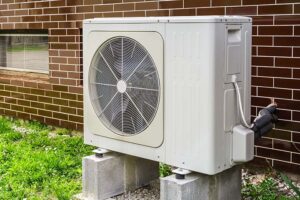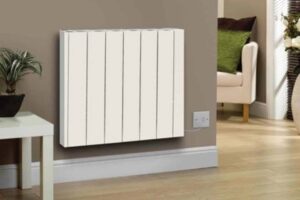Table of Contents
Boilers are designed to heat water, so it should come as unsurprising that the boiler sometimes overheats. An overheating boiler might be quite dangerous. There are many reasons why it happens, from blockages and limescale buildup to internal unit problems. Fortunately, your boiler is equipped with a number of safety systems that prevent anything very dangerous from happening. If this happens, however, it would be helpful to look into the root cause of the overheating in the very beginning.
A boiler will usually monitor when the temperature reaches an unsafe level and activate a safety feature that shuts down the boiler. All high-quality modern boilers come with this safety feature, which was added in recent years.
People also ask the same question: Why is my boiler overheating? Below, we run through the problem of overheating and some of the signs that could show your boiler is overheating, as well as the causes and how to solve the problem.
Why is an Overheating Boiler a Problem?
When a boiler overheats, some parts can melt, and toxic gases can be released into the environment. In the worst situation, the boiler might even explode.
The risks linked to boiler overheating have decreased over the years because of modern boilers’ safety measures and ability to run at high pressures.
How to Detect Overheating in your Boiler
Even in the middle of running, your boiler is likely to shut off automatically if it is overheating, and it could even show an error code. This is an important safety feature that is also referred to as boiler lockout. Therefore, overheating might be the cause of your boiler’s turning itself off.
In such a situation, the issue has to be addressed right away. It is important to take extreme temperatures seriously since they may put a lot of pressure on a boiler’s interior components and increase the risk of boiler damage. Read on to learn about the symptoms, causes, and possible solutions as a result.
What Indicates Overheating in a Boiler?
If your boiler overheats, it will lock out. An error code will then appear on the boiler, indicating that it is overheating.
Why is my Boiler Overheating?
It’s not always clear which issue is to blame for a boiler overheating because there are multiple causes for the occurrence. Consider a few of the most typical reasons to see which one may be affecting your boiler.
- Limescale Accumulation
- Pump Failure
- Thermistor Problems
- System Blockage
Limescale Accumulation
Your boiler may overheat if there is a layer of limescale on the heat exchanger, which restricts the flow of water.
In the heating system, the heat exchanger’s function is to reheat the cooler water before it is pumped through the radiators. This could increase the chance of overheating while also shortening the boiler’s lifespan.
This limescale release is called kettling because it can make noises like a kettle whistle. If you hear a kettle, contact a heating specialist to flush out the system and remove any limescale.
Pump Failure
Water is circulated throughout the central heating system by the pump. The boiler may overheat if something stops the hot water from leaving the boiler. Perhaps the pump can be fixed by a heating specialist, but more often than not, a new pump will be needed.
Thermistor Problems
The water’s temperature is continuously monitored by the Printed Circuit Board (PCB), which determines whether to raise or lower it in response to demand.
The boiler may overheat if the thermistor breaks down and the water temperature increases too much.
Only a completely certified heating specialist can fix a thermistor; in most cases, it has to be replaced.
System Blockage
Have you noticed strange noises coming from your central heating system as they indicate a blockage?
If any of your radiators haven’t been heating up effectively, that’s another warning sign.
Radiators that don’t heat up can potentially have excess air that needs to be drained.
A major blockage will require a power flush, which must be performed by a heating professional. A power flush is a cleaning technique that clears the central heating system of all trash, including limescale and rust. Hot water can freely circulate around the radiators to ensure optimal and effective heating of the area.
After discussing the causes of overheating boilers, we’re going through how to stop boilers from overheating.
How to Stop my Boiler from Overheating
What steps can you take to fix why is my boiler overheating now that you are aware of some of the causes? Although we’ve included some suggestions below, it’s typically a good idea to get a qualified Gas Safe heating engineer to come out and safely solve the issue for you.
Power Flush the System
The only way to prevent a boiler from overheating due to limescale buildup may be to power-flash the system. To remove any built-up rust, limescale, and other particles, a power flush involves pushing new water through the system at a high pressure.
Check your Condensate Pipe
It’s really easy to check your condensate pipe for ice, and if there are icicles on it, you can use warm water to defrost them and unblock the pipe.
Check the PRV (Pressure Release Valve)
A Gas Safe heating specialist can inspect the PRV to make sure it is functioning effectively and isn’t cracked in order to remove the system of excess pressure. A replacement part may be required.
Replace the Pump
You might require a new central heating pump if the problem derives from a faulty one. If this is the case, a heating engineer needs to be able to tell you and install it for you.
Replace the Thermistor
If a faulty thermistor is the cause of the overheating, the device may need to be replaced. An experienced engineer is the best person for this work; they can advise you on the best size and type.
Add a scale Reducer
Limescale can be the cause of several of the problems we’ve discussed in this article, including blockages, kettling, and faulty central heating pumps. If you reside in a region with hard water, you might wish to install a water softener or scale inhibitor in your system according to the manufacturer’s instructions. In order to completely prevent any problems in this situation,
If your boiler is too old, that may cause overheating, so there’s only one solution to change your boiler. Because old boilers that are out of age are lazy and efficient in generating high energy bills. Also, they produce some unknown voices that indicate your boilers need to be updated.
By realising this situation, the government of the UK took steps to provide boiler grants for those who need them most or, in short, those who could not afford the new boiler. It’s support from the government that aims to replace their old inefficient boiler with new efficient ones through the ECO4 scheme.
Reaching Net Zero Emissions!
Conclusion
Why is my boiler overheating? A manageable issue with timely action and regular maintenance. Whether you choose a boiler or a heat pump. Understanding their operation and maintenance requirements is key to enjoying a warm and comfortable home.
Frequently Asked Questions
Strange noises can indicate potential issues such as overheating. Turn off the boiler and consult a professional for inspection.
Yes, low water pressure can disrupt the boiler’s normal operation and lead to overheating. Ensure water levels are adequate.
Before doing any troubleshooting, it is safer to turn off the boiler and let it cool. Safety should always come first, and if in doubt, seek professional advice.
It’s recommended to schedule annual maintenance. Checks to ensure your boiler is functioning efficiently and safely.



